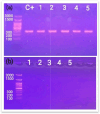Identification of genetic mutations conferring tedizolid resistance in MRSA mutants
- PMID: 40360924
- PMCID: PMC12321651
- DOI: 10.1007/s10096-025-05157-x
Identification of genetic mutations conferring tedizolid resistance in MRSA mutants
Abstract
Purpose: In light of previous studies eliminating the involvement of gene-mediated mechanisms in developing tedizolid resistance, our study elucidates the ability of mutation-mediated mechanisms to confer oxazolidinones cross-resistance in methicillin-resistant Staphylococcus aureus (MRSA). With further investigation of the identified mutations and their relation to tedizolid resistance. Additionally, the involvement of rpoB mutations in acquiring resistance to tedizolid was also investigated.
Methods: Five cfr-negative, methicillin-resistant Staphylococcus aureus clinical isolates were subjected to in vitro selection to develop linezolid-resistant mutants. The resultant mutants were tested for acquiring tedizolid cross-resistance, whole genome sequencing was performed twice, followed by variant calling and annotation. Detected mutations were analyzed for their relatedness to the developed resistance.
Results: Mutations considered relevant to tedizolid resistance were detected in rpoB gene encoding β-subunit of the RNA polymerase enzyme and rplC gene encoding the 50S ribosomal protein L3. Additionally, mutations in mepB gene, part of the mepRAB operon were detected and believed to contribute to acquiring linezolid resistance.
Conclusion: To the best of our knowledge, our findings are the first to report the 50S ribosomal protein L3 mutation Gly152Asp to solely confer cross-resistance to both linezolid and tedizolid oxazolidinones. In addition, we report the emergence of cross-resistance between oxazolidinone antibiotics and rifampin through a single amino-acid substitution occurring within the Rifampin Resistance Determining Region (RRDR). Furthermore, mepB mutations reported in our results support a theory implying a second MepR-independent mechanism regulating the mepRAB operon, and are believed to be responsible for the acquired linezolid resistance in our study.
Keywords: mepB; mepRAB operon; Cross-resistance; MRSA; Mutation; Tedizolid.
© 2025. The Author(s).
Conflict of interest statement
Declarations. Ethical approval: Not applicable. Informed consent: Not applicable. Competing interests: The authors declare no competing interests.
Figures
References
-
- Liu F, Rajabi S, Shi C, Afifirad G, Omidi N, Kouhsari E, Khoshnood S, Azizian K (2022) Antibacterial activity of recently approved antibiotics against methicillin-resistant Staphylococcus aureus (MRSA) strains: A systematic review and meta-analysis. Ann Clin Microbiol Antimicrob 21:37. 10.1186/s12941-022-00529-z - PMC - PubMed
-
- Tsiodras S, Gold HS, Sakoulas G, Eliopoulos GM, Wennersten C, Venkataraman L, Moellering RC, Ferraro MJ (2001) Linezolid resistance in a clinical isolate of Staphylococcus aureus. Lancet 358:207–208. 10.1016/S0140-6736(01)05410-1 - PubMed
-
- Wilson P, Andrews JA, Charlesworth R, Walesby R, Singer M, Farrell DJ, Robbins M (2003) Linezolid resistance in clinical isolates of Staphylococcus aureus. J Antimicrob Chemother 51:186–188. 10.1093/jac/dkg104 - PubMed
-
- Ruiz-Ripa L, Feßler AT, Hanke D, Eichhorn I, Azcona-Gutiérrez JM, Alonso CA, Pérez-Moreno MO, Aspiroz C, Bellés A, Schwarz S et al (2021) Mechanisms of linezolid resistance among clinical Staphylococcus spp. In Spain: spread of Methicillin- and linezolid-Resistant S. epidermidis ST2. Microbial drug resistance. (Larchmont N Y) 27:145–153. 10.1089/mdr.2020.0122 - PubMed
MeSH terms
Substances
LinkOut - more resources
Full Text Sources
Medical


